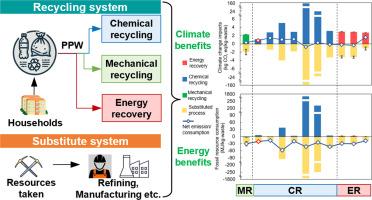哪种塑料回收方法能最大限度地提高气候效益并平衡化石能源?来自日本经验的证据
IF 10.9
1区 环境科学与生态学
Q1 ENGINEERING, ENVIRONMENTAL
引用次数: 0
摘要
循环被认为是在塑料废物管理中实现碳中和的关键。本研究评估了日本塑料包装废弃物(PPW)的各种回收和回收方案,包括循环和单向化学回收。利用生命周期评估,我们从化石资源消耗和气候变化影响的角度考察了这些选择,将化石资源分为煤炭、石油和天然气。所有被评估的选择都提供化石能源效益,然而一些化学回收技术难以实现气候效益。气化制氨提供了最高的化石能源效益,而在高炉中使用PPW作为焦炭替代品产生了最大的气候效益。事实证明,机械和循环化学回收在减少石油消耗方面是有效的,但在气候效益方面并没有提供最大的优势。从这项研究中获得的日本经验的见解强调了碳中和的权宜之计解决方案与概念上的循环回收方法之间的差异。本文章由计算机程序翻译,如有差异,请以英文原文为准。

Which plastic recycling approaches maximize climate benefits and balance fossil energy? Evidence from the Japanese experience
Circularity is considered to be pivotal for achieving carbon neutrality in plastic waste management. This study evaluated various recycling and recovery options for plastic packaging waste (PPW) in Japan, including circular and one-way chemical recycling. Using life cycle assessment, we examined these options in terms of fossil resource consumption and climate change impacts, categorizing fossil resources into coal, oil, and natural gas. All the evaluated options provide fossil energy benefits, however some chemical recycling technologies struggle to achieve climate benefits. Gasification for ammonia production provides the highest fossil energy benefits, while use of PPW in blast furnaces as coke substitute yielded the greatest climate benefits. Mechanical and circular chemical recycling proved effective in reducing oil consumption but did not offer the greatest advantages in terms of climate benefits. Insights from Japan’s experiences obtained from this study highlight a disparity between expedient solutions for carbon neutrality and conceptually circular recycling approaches.
求助全文
通过发布文献求助,成功后即可免费获取论文全文。
去求助
来源期刊

Resources Conservation and Recycling
环境科学-工程:环境
CiteScore
22.90
自引率
6.10%
发文量
625
审稿时长
23 days
期刊介绍:
The journal Resources, Conservation & Recycling welcomes contributions from research, which consider sustainable management and conservation of resources. The journal prioritizes understanding the transformation processes crucial for transitioning toward more sustainable production and consumption systems. It highlights technological, economic, institutional, and policy aspects related to specific resource management practices such as conservation, recycling, and resource substitution, as well as broader strategies like improving resource productivity and restructuring production and consumption patterns.
Contributions may address regional, national, or international scales and can range from individual resources or technologies to entire sectors or systems. Authors are encouraged to explore scientific and methodological issues alongside practical, environmental, and economic implications. However, manuscripts focusing solely on laboratory experiments without discussing their broader implications will not be considered for publication in the journal.
 求助内容:
求助内容: 应助结果提醒方式:
应助结果提醒方式:


